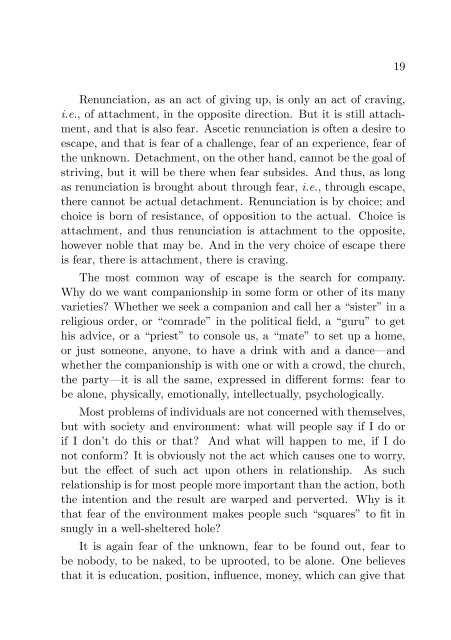Problems Bared, Essays on Buddhism
Essays on various aspects of the Buddha’s teaching.
Essays on various aspects of the Buddha’s teaching.
You also want an ePaper? Increase the reach of your titles
YUMPU automatically turns print PDFs into web optimized ePapers that Google loves.
19<br />
Renunciati<strong>on</strong>, as an act of giving up, is <strong>on</strong>ly an act of craving,<br />
i.e., of attachment, in the opposite directi<strong>on</strong>. But it is still attachment,<br />
and that is also fear. Ascetic renunciati<strong>on</strong> is often a desire to<br />
escape, and that is fear of a challenge, fear of an experience, fear of<br />
the unknown. Detachment, <strong>on</strong> the other hand, cannot be the goal of<br />
striving, but it will be there when fear subsides. And thus, as l<strong>on</strong>g<br />
as renunciati<strong>on</strong> is brought about through fear, i.e., through escape,<br />
there cannot be actual detachment. Renunciati<strong>on</strong> is by choice; and<br />
choice is born of resistance, of oppositi<strong>on</strong> to the actual. Choice is<br />
attachment, and thus renunciati<strong>on</strong> is attachment to the opposite,<br />
however noble that may be. And in the very choice of escape there<br />
is fear, there is attachment, there is craving.<br />
The most comm<strong>on</strong> way of escape is the search for company.<br />
Why do we want compani<strong>on</strong>ship in some form or other of its many<br />
varieties? Whether we seek a compani<strong>on</strong> and call her a “sister” in a<br />
religious order, or “comrade” in the political field, a “guru” to get<br />
his advice, or a “priest” to c<strong>on</strong>sole us, a “mate” to set up a home,<br />
or just some<strong>on</strong>e, any<strong>on</strong>e, to have a drink with and a dance—and<br />
whether the compani<strong>on</strong>ship is with <strong>on</strong>e or with a crowd, the church,<br />
the party—it is all the same, expressed in different forms: fear to<br />
be al<strong>on</strong>e, physically, emoti<strong>on</strong>ally, intellectually, psychologically.<br />
Most problems of individuals are not c<strong>on</strong>cerned with themselves,<br />
but with society and envir<strong>on</strong>ment: what will people say if I do or<br />
if I d<strong>on</strong>’t do this or that? And what will happen to me, if I do<br />
not c<strong>on</strong>form? It is obviously not the act which causes <strong>on</strong>e to worry,<br />
but the effect of such act up<strong>on</strong> others in relati<strong>on</strong>ship. As such<br />
relati<strong>on</strong>ship is for most people more important than the acti<strong>on</strong>, both<br />
the intenti<strong>on</strong> and the result are warped and perverted. Why is it<br />
that fear of the envir<strong>on</strong>ment makes people such “squares” to fit in<br />
snugly in a well-sheltered hole?<br />
It is again fear of the unknown, fear to be found out, fear to<br />
be nobody, to be naked, to be uprooted, to be al<strong>on</strong>e. One believes<br />
that it is educati<strong>on</strong>, positi<strong>on</strong>, influence, m<strong>on</strong>ey, which can give that

















